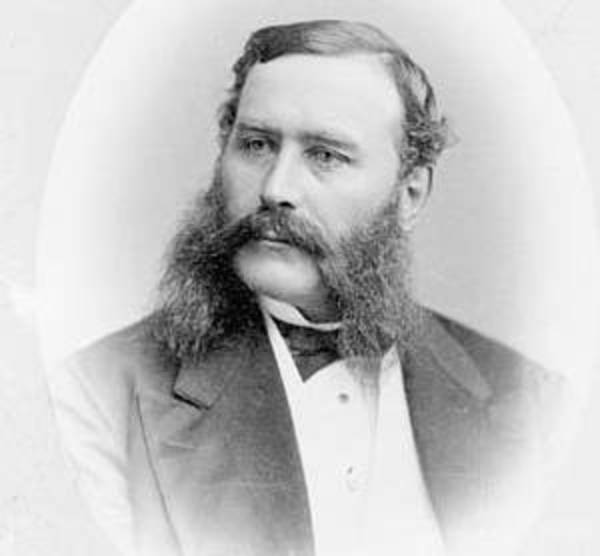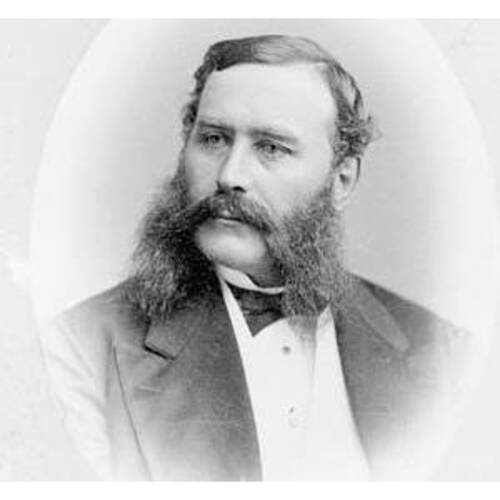
Source: Courtesy of Wikimedia Commons
LAUDER, ABRAM (Abraham) WILLIAM, lawyer and politician; b. 6 June 1834 at Bewcastle (Cumbria), England, son of Thomas D. Lauder; d. 20 Feb. 1884 at Toronto, Ont.
Abram William Lauder received his early education at Canonbie and Langholm (Dumfries and Galloway), Scotland. It is not known when he came to Canada but in 1853 he received a provincial certificate from the Toronto Normal School. He taught for four years in Ontario County. In 1856 Lauder married Maria (Marie) Elise Toof of Whitby, who was later to write travel books. Their only child, William Waugh, became an outstanding pianist.
In 1857 Lauder and his wife moved to Toronto where he became a law student. He articled with the firm of Ross, Crawford and Crombie and was called to the bar in 1864. He and John Ross*, senior member of the firm in which he had articled, established the firm of Ross and Lauder. Lauder remained in partnership with Ross until the latter’s death in 1871. He continued a successful law practice in Toronto until he died.
Lauder first entered the political arena in September 1867 when he successfully stood for election to the Ontario legislature in the riding of Grey South. He took a non-partisan position in his first election and supported the coalition government of John Sandfield Macdonald*. However, as his political career progressed he clarified both his loyalty and his ideology, becoming a supporter of the Conservative party. His re-election on 21 March 1871 was based on his constant attention to his constituency, a predominantly farming community. Thus he argued against land policies that favoured speculation and supported land reform legislation in 1868. He also favoured expansion of railways to his riding and in 1869 took an active role as the government trustee of the municipal bonds for the development of the Toronto, Grey and Bruce Railway.
Lauder, in speeches in the legislature, regularly condemned corrupt practices at all levels of government. It was ironic, therefore, and probably extremely painful, that he himself should be accused of corruption. Following the election of 1871, a constituent, Alexander Hunter, filed a petition against Lauder on 26 April. A trial was begun in Owen Sound in September, and then adjourned until November when Oliver Mowat*, who presided, declared that Lauder had not been duly elected. Although Mowat found that one of Lauder’s workers had contravened the Election Act of 1868 by using bribery, travel expenses, and “entertainment,” in the form of liquor, to obtain votes, neither candidate was found guilty of corrupt practices. Lauder was able to stand in the by-election and was again returned, in January 1872. The campaign for this contest provided him with an opportunity for revenge.
In the house he produced affidavits from five of his constituents which charged John W. Lewis, a government land valuator, with influencing voters in Proton by promising that the new Liberal government under Edward Blake* would take a “liberal policy” in dealing with the residents of Grey County. Lauder also implicated such prominent Liberals as Archibald McKellar*, Adam Oliver, Blake, and Blake’s law partner James Kirkpatrick Kerr. A select committee (headed by John Charles Rykert, “an unswerving Conservative”) assembled on 9 Feb. 1872 and the “Proton Outrage” investigation began. McKellar, Oliver, and Kerr all testified, as did Thomas Hall Johnson, the assistant commissioner of crown lands. Blake also appeared briefly to deny any complicity. Lauder, although not a member of the committee, conducted most of the questioning. The unanimous report delivered on 29 February found Lewis culpable and implicated Oliver, McKellar, and Kerr, but absolved all others. Lauder’s political success then continued unabated; after the redistribution of the Grey County ridings in 1874 he was elected for Grey East until his death.
Perhaps the most dramatic moment in Lauder’s life occurred shortly after the investigation, during the Toronto printers’ strike of 1872. Lauder was one of the lawyers hired by the Toronto Typographical Union to defend its strike committee which had been charged with conspiracy by the Master Printers’ Association under an English law of 1792 constraining labour combinations. At a protest rally on 16 April which followed the arrests of the union leaders, Lauder delivered a moving impromptu address in which he rejected the master printers’ exploitation of the confused condition of Canadian law concerning labour organizations. He condemned these unwarranted arrests for being “at variance with freedom and equality.” As a Conservative, he was perhaps encouraged in his defence of civil liberty by the fact that George Brown*, the prominent Liberal, had initiated the legal action.
Lauder’s contribution was that of an intelligent, principled member of the community whose consciousness of responsibility is reflected in both his professional and his non-professional duties. He was also secretary treasurer for Canada of the Star Life Insurance Company, based in Britain, and, with John Ross, was a promoter and initial shareholder of the Dominion Bank. A Methodist, he negotiated with Egerton Ryerson the purchase of the land on which the Metropolitan Church in Toronto was built and he was a member of the senate of Victoria College at Cobourg.
Ont., Legislative Library, Newspaper Hansard, 30 Dec. 1867 (mfm. at AO); Legislative Assembly, Journals, 1867–68; 1871–73; Legislature, Sessional papers, 1873, III: no.49; Statutes, 1868, c.8; 1868–69, c.20, c.21; 1870–71, c.3. Globe, 21 Feb. 1884. Ontario Workman (Toronto), 18 April, 9 May 1872. Canadian biog. dict., I: 90–92. Canadian men and women of the time (Morgan, 1898), 564. CPC, 1873: 331; 1881: 249.
Cite This Article
Sally F. Zerker, “LAUDER, ABRAM (Abraham) WILLIAM,” in Dictionary of Canadian Biography, vol. 11, University of Toronto/Université Laval, 2003–, accessed February 27, 2026, https://www.biographi.ca/en/bio/lauder_abram_william_11E.html.
The citation above shows the format for footnotes and endnotes according to the Chicago manual of style (16th edition). Information to be used in other citation formats:
| Permalink: | https://www.biographi.ca/en/bio/lauder_abram_william_11E.html |
| Author of Article: | Sally F. Zerker |
| Title of Article: | LAUDER, ABRAM (Abraham) WILLIAM |
| Publication Name: | Dictionary of Canadian Biography, vol. 11 |
| Publisher: | University of Toronto/Université Laval |
| Year of publication: | 1982 |
| Year of revision: | 1982 |
| Access Date: | February 27, 2026 |



